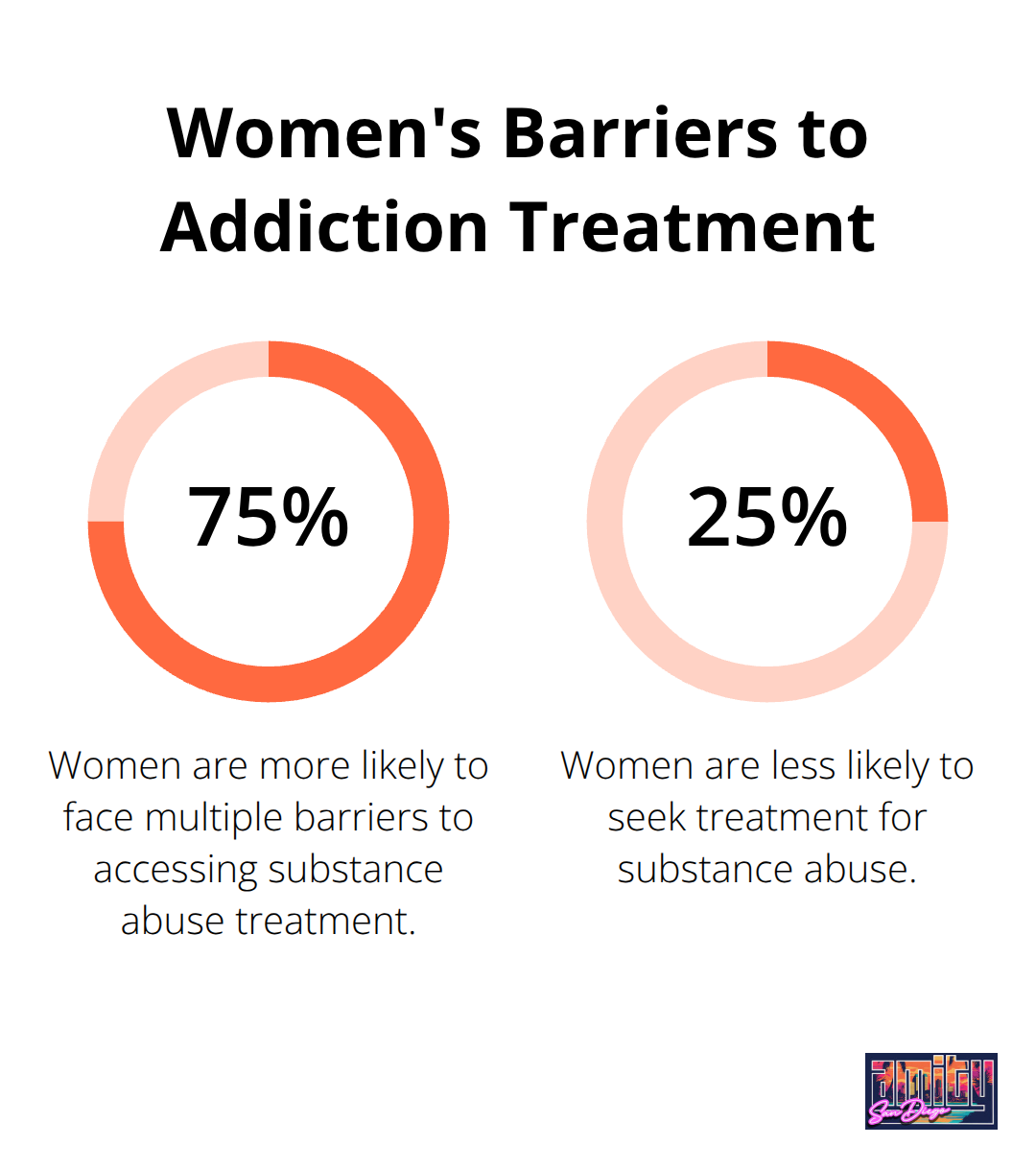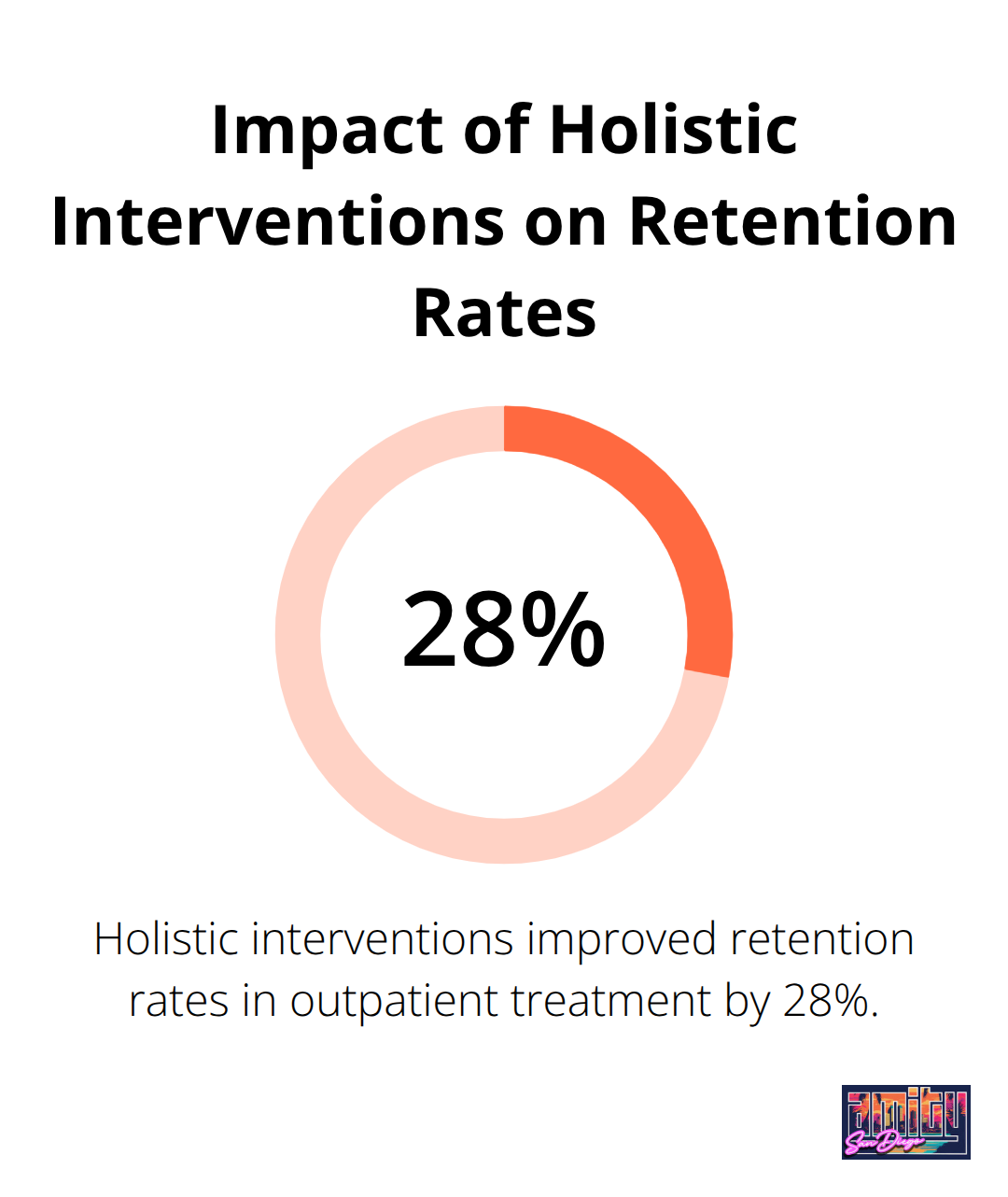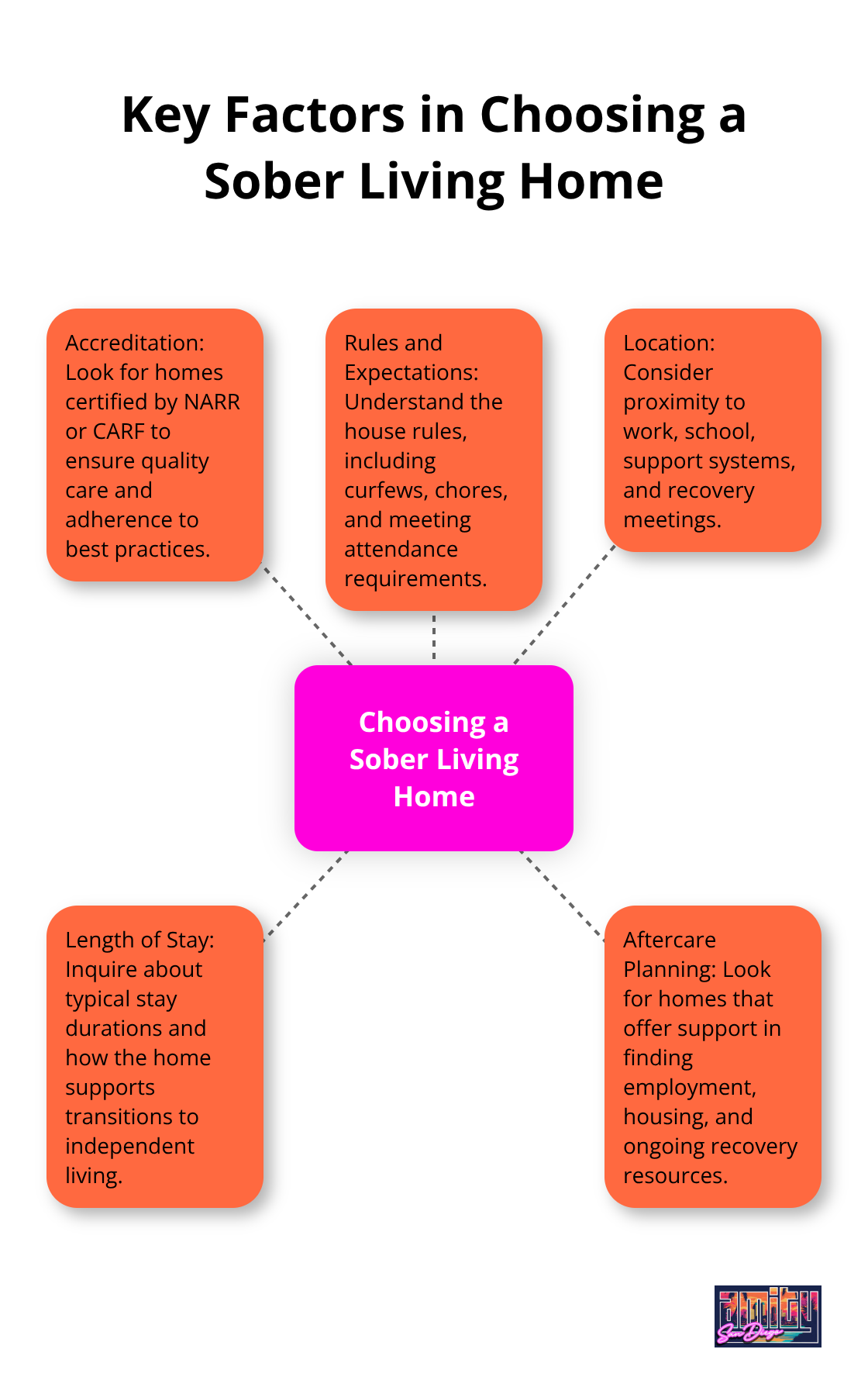At Amity San Diego, we understand the unique challenges women face in recovery. Sober living houses for women provide a safe haven for those seeking to rebuild their lives after addiction.
These gender-specific environments offer crucial support, understanding, and tailored resources that can make all the difference in a woman’s journey to lasting sobriety.
In this post, we’ll explore the benefits of women’s sober living homes and how to find the right one for you or your loved one.
Why Women-Only Recovery Matters
Unique Challenges for Women in Recovery
At Amity San Diego, we recognize the distinct obstacles women face during addiction recovery. Women are more likely than men to face multiple barriers to accessing substance abuse treatment and are less likely to seek treatment. Women-only settings allow for open discussion of these sensitive issues without judgment.

Creating a Safe and Trusting Environment
Women’s sober living homes foster an atmosphere of trust that’s difficult to replicate in mixed-gender settings. This safety enables residents to concentrate fully on their recovery without distractions or complications (which can often arise in co-ed environments). Research from the Journal of Substance Abuse Treatment indicates that women in gender-specific programs show higher rates of treatment completion and sobriety maintenance.
Fostering Personal Growth and Empowerment
Gender-specific recovery programs help women reclaim their identities beyond addiction. These environments cultivate leadership skills, boost self-esteem, and encourage mutual support among residents. A Substance Abuse and Mental Health Services Administration survey found that women in gender-specific treatment reported higher levels of engagement and satisfaction with their recovery process.
Addressing Women-Specific Health Concerns
Women’s bodies process substances differently than men’s, which can lead to unique health challenges during recovery. Women-only programs can better address these specific needs, including hormonal imbalances, reproductive health issues, and pregnancy-related concerns. This tailored approach (which considers the intricate relationship between physical and mental health) supports more comprehensive healing.
Building a Supportive Community
Women-only recovery environments create a strong sense of community and sisterhood. This bond often extends beyond the treatment period, providing a lifelong support network. Shared experiences and understanding among peers can significantly reduce feelings of isolation and shame commonly associated with addiction.
As we move forward, let’s explore the key features that make women’s sober living homes effective in supporting long-term recovery and personal transformation.
What Makes Women’s Sober Living Homes Effective?
Women’s sober living homes offer unique features that cater to the specific needs of women in their journey to sobriety. These environments provide essential elements for recovery and personal transformation.
A Haven of Safety and Security
Women’s sober living homes prioritize creating a secure environment. This extends beyond physical safety to emotional and psychological security. Many homes implement:
- 24/7 staff presence
- Secure entry systems
- Strict visitor policies
This level of protection allows residents to focus on their recovery without external worries.
Daily Structure That Promotes Healing
Structure plays a vital role in early recovery. Women’s sober living homes typically implement daily schedules that include:
- Therapy sessions
- Support group meetings
- Household responsibilities
This routine helps residents develop healthy habits and time management skills. A typical day might include a morning meditation, group therapy session, individual counseling, and an evening 12-step meeting.
Tailored Support and Therapy
Gender-specific support groups and therapy sessions form the cornerstone of women’s sober living homes. These allow for open discussions on issues like:
- Body image
- Relationships
- Trauma
Dialectical Behavior Therapy (DBT), an evidence-based method, really gives women tools that enable emotional regulation, recovery, and empowerment.
Holistic Wellness Focus
Women’s sober living homes often emphasize holistic wellness activities. These might include:
- Yoga classes
- Nutritional counseling
- Art therapy
- Outdoor activities
These programs help residents reconnect with their bodies and develop healthy coping mechanisms. A 2022 review in the Journal of Substance Abuse Treatment found that holistic interventions improved retention rates by up to 28% in outpatient treatment.

Community and Peer Support
The power of community cannot be overstated in recovery. Women’s sober living homes foster an environment of mutual support and understanding. Residents often form strong bonds with their peers, creating a network that extends beyond their stay in the home.
This sense of community (which can be especially powerful for women who have felt isolated in their addiction) provides emotional support, accountability, and encouragement throughout the recovery process.
Now that we’ve explored the key features of women’s sober living homes, let’s examine how to choose the right home that aligns with your specific needs and recovery goals.
Finding Your Perfect Sober Living Home
Choosing the right sober living home is a key step in your recovery journey. The right environment can make all the difference. Here’s how to find a home that supports your unique needs and goals.
Accreditation: A Mark of Quality
Start your search with accredited facilities. The National Alliance for Recovery Residences (NARR) provides guidance for certifying effective recovery residences and incorporates collaborative values of acute care and social models. Homes with NARR certification follow strict guidelines for safety, ethics, and quality of care. The Commission on Accreditation of Rehabilitation Facilities (CARF) is another respected accrediting body. CARF International is an independent, nonprofit accreditor helping health and human service providers meet high-quality, globally recognized standards. These certifications ensure you choose a home committed to best practices in recovery support.

Understanding Rules and Expectations
Every sober living home has its own set of rules. These typically include curfews, chore assignments, and attendance at support meetings. Some homes require residents to work or attend school. Others may have stricter policies around visitors or electronic devices.
Ask for a written copy of house rules before you commit. Make sure you feel comfortable with the expectations. These rules create a structured, supportive environment for recovery. If a home’s policies feel too restrictive (or too lax) for your needs, continue your search.
The Importance of Location
The location of your sober living home can significantly impact your recovery. Consider proximity to:
- Your workplace or school
- Family and support systems
- Recovery meetings and therapy appointments
- Public transportation
Choose a location that makes it easy to balance these important aspects of recovery. A well-situated home can enhance your chances of long-term success.
Planning for Your Stay and Beyond
Recovery isn’t a race. Many people benefit from longer stays in sober living environments.
Ask about typical lengths of stay and how the home supports transitions. Look for homes that offer:
- Gradual increases in independence
- Support in finding employment or housing
- Aftercare planning
- Alumni programs
The best sober living homes view your stay as part of a larger journey towards independent, sober living.
Trust Your Instincts
Choosing a sober living home is a personal decision. What works for one person may not work for another. Ask questions, and don’t settle for a home that doesn’t feel right. Your recovery deserves the best possible support.
Final Thoughts
Women’s sober living houses offer a unique and powerful environment for recovery. These gender-specific spaces provide safety, understanding, and tailored support that many women need to overcome addiction and rebuild their lives. The benefits of women-specific sober living include a trusting atmosphere, deep bonds among residents, and a sanctuary where women focus entirely on their healing journey.
Choosing the right sober living house for women represents a key step in recovery. Factors such as accreditation, house rules, location, and transition planning help find a home that aligns with individual needs and recovery goals. This decision requires personal consideration, and trusting one’s instincts proves essential when selecting a sober living environment.
At Amity San Diego, we believe in the power of personalized, compassionate care. Our outpatient programs offer evidence-based treatment in a supportive environment, helping individuals reclaim their lives from addiction. If you’re ready to start your journey to recovery, reach out for a free, confidential assessment. A life free from addiction awaits you, and with the right support, you can achieve lasting sobriety and personal transformation.



